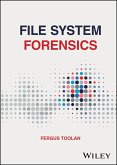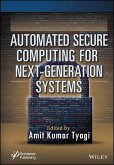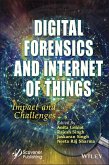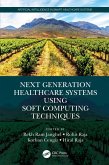Next-Generation Systems and Secure Computing (eBook, ePUB)
Redaktion: Barman, Subhabrata; Joardar, Subhankar; Koley, Santanu
188,99 €
188,99 €
inkl. MwSt.
Sofort per Download lieferbar

0 °P sammeln
188,99 €
Als Download kaufen

188,99 €
inkl. MwSt.
Sofort per Download lieferbar

0 °P sammeln
Jetzt verschenken
Alle Infos zum eBook verschenken
188,99 €
inkl. MwSt.
Sofort per Download lieferbar
Alle Infos zum eBook verschenken

0 °P sammeln
Next-Generation Systems and Secure Computing (eBook, ePUB)
Redaktion: Barman, Subhabrata; Joardar, Subhankar; Koley, Santanu
- Format: ePub
- Merkliste
- Auf die Merkliste
- Bewerten Bewerten
- Teilen
- Produkt teilen
- Produkterinnerung
- Produkterinnerung

Bitte loggen Sie sich zunächst in Ihr Kundenkonto ein oder registrieren Sie sich bei
bücher.de, um das eBook-Abo tolino select nutzen zu können.
Hier können Sie sich einloggen
Hier können Sie sich einloggen
Sie sind bereits eingeloggt. Klicken Sie auf 2. tolino select Abo, um fortzufahren.

Bitte loggen Sie sich zunächst in Ihr Kundenkonto ein oder registrieren Sie sich bei bücher.de, um das eBook-Abo tolino select nutzen zu können.
Next-Generation Systems and Secure Computing is essential for anyone looking to stay ahead in the rapidly evolving landscape of technology. It offers crucial insights into advanced computing models and their security implications, equipping readers with the knowledge needed to navigate the complex challenges of today's digital world.
The development of technology in recent years has produced a number of scientific advancements in sectors like computer science. The advent of new computing models has been one particular development within this sector. New paradigms are always being invented,…mehr
- Geräte: eReader
- mit Kopierschutz
- eBook Hilfe
- Größe: 7.79MB
Andere Kunden interessierten sich auch für
![File System Forensics (eBook, ePUB) File System Forensics (eBook, ePUB)]() Fergus ToolanFile System Forensics (eBook, ePUB)116,99 €
Fergus ToolanFile System Forensics (eBook, ePUB)116,99 €![Practical Linux Forensics (eBook, ePUB) Practical Linux Forensics (eBook, ePUB)]() Bruce NikkelPractical Linux Forensics (eBook, ePUB)26,95 €
Bruce NikkelPractical Linux Forensics (eBook, ePUB)26,95 €![Automated Secure Computing for Next-Generation Systems (eBook, ePUB) Automated Secure Computing for Next-Generation Systems (eBook, ePUB)]() Automated Secure Computing for Next-Generation Systems (eBook, ePUB)194,99 €
Automated Secure Computing for Next-Generation Systems (eBook, ePUB)194,99 €![Digital Forensics and Internet of Things (eBook, ePUB) Digital Forensics and Internet of Things (eBook, ePUB)]() Digital Forensics and Internet of Things (eBook, ePUB)184,99 €
Digital Forensics and Internet of Things (eBook, ePUB)184,99 €![The Power of Artificial Intelligence for the Next-Generation Oil and Gas Industry (eBook, ePUB) The Power of Artificial Intelligence for the Next-Generation Oil and Gas Industry (eBook, ePUB)]() Pethuru Raj ChelliahThe Power of Artificial Intelligence for the Next-Generation Oil and Gas Industry (eBook, ePUB)107,99 €
Pethuru Raj ChelliahThe Power of Artificial Intelligence for the Next-Generation Oil and Gas Industry (eBook, ePUB)107,99 €![Next Generation Healthcare Systems Using Soft Computing Techniques (eBook, ePUB) Next Generation Healthcare Systems Using Soft Computing Techniques (eBook, ePUB)]() Next Generation Healthcare Systems Using Soft Computing Techniques (eBook, ePUB)45,95 €
Next Generation Healthcare Systems Using Soft Computing Techniques (eBook, ePUB)45,95 €![Secret Key Cryptography (eBook, ePUB) Secret Key Cryptography (eBook, ePUB)]() Frank RubinSecret Key Cryptography (eBook, ePUB)36,58 €
Frank RubinSecret Key Cryptography (eBook, ePUB)36,58 €-
-
-
Next-Generation Systems and Secure Computing is essential for anyone looking to stay ahead in the rapidly evolving landscape of technology. It offers crucial insights into advanced computing models and their security implications, equipping readers with the knowledge needed to navigate the complex challenges of today's digital world.
The development of technology in recent years has produced a number of scientific advancements in sectors like computer science. The advent of new computing models has been one particular development within this sector. New paradigms are always being invented, greatly expanding cloud computing technology. Fog, edge, and serverless computing are examples of these revolutionary advanced technologies. Nevertheless, these new approaches create new security difficulties and are forcing experts to reassess their current security procedures. Devices for edge computing aren't designed with the same IT hardware protocols in mind. There are several application cases for edge computing and the Internet of Things (IoT) in remote locations. Yet, cybersecurity settings and software upgrades are commonly disregarded when it comes to preventing cybercrime and guaranteeing data privacy.
Next-Generation Systems and Secure Computing compiles cutting-edge studies on the development of cutting-edge computing technologies and their role in enhancing current security practices. The book will highlight topics like fault tolerance, federated cloud security, and serverless computing, as well as security issues surrounding edge computing in this context, offering a thorough discussion of the guiding principles, operating procedures, applications, and unexplored areas of study. Next-Generation Systems and Secure Computing is a one-stop resource for learning about the technology, procedures, and individuals involved in next-generation security and computing.
The development of technology in recent years has produced a number of scientific advancements in sectors like computer science. The advent of new computing models has been one particular development within this sector. New paradigms are always being invented, greatly expanding cloud computing technology. Fog, edge, and serverless computing are examples of these revolutionary advanced technologies. Nevertheless, these new approaches create new security difficulties and are forcing experts to reassess their current security procedures. Devices for edge computing aren't designed with the same IT hardware protocols in mind. There are several application cases for edge computing and the Internet of Things (IoT) in remote locations. Yet, cybersecurity settings and software upgrades are commonly disregarded when it comes to preventing cybercrime and guaranteeing data privacy.
Next-Generation Systems and Secure Computing compiles cutting-edge studies on the development of cutting-edge computing technologies and their role in enhancing current security practices. The book will highlight topics like fault tolerance, federated cloud security, and serverless computing, as well as security issues surrounding edge computing in this context, offering a thorough discussion of the guiding principles, operating procedures, applications, and unexplored areas of study. Next-Generation Systems and Secure Computing is a one-stop resource for learning about the technology, procedures, and individuals involved in next-generation security and computing.
Dieser Download kann aus rechtlichen Gründen nur mit Rechnungsadresse in D ausgeliefert werden.
Produktdetails
- Produktdetails
- Verlag: John Wiley & Sons
- Seitenzahl: 662
- Erscheinungstermin: 17. März 2025
- Englisch
- ISBN-13: 9781394228478
- Artikelnr.: 73675108
- Verlag: John Wiley & Sons
- Seitenzahl: 662
- Erscheinungstermin: 17. März 2025
- Englisch
- ISBN-13: 9781394228478
- Artikelnr.: 73675108
- Herstellerkennzeichnung Die Herstellerinformationen sind derzeit nicht verfügbar.
Subhabrata Barman is an assistant professor in the Department of Computer Science and Engineering, Haldia Institute of Technology, West Bengal, India, with over 19 years of teaching and research experience. He has edited a number of internationally published books and journals. Additionally, he is a professional member of the Computer Society of India, the Institute for Electrical and Electronics Engineers, the International Association of Computer Science and Information Technology, and the International Association of Engineers. His research interests include wireless networks, computational intelligence, remote sensing and geoinformatics, precision agriculture, and parallel and grid computing. Santanu Koley, PhD, is a professor in the Computer Science and Engineering Department at Haldia Institute of Technology, West Bengal, India, with more than 19 years of teaching experience and more than eighteen years of research experience. He has published over 50 research publications in numerous national and international journals, conferences, books, and book chapters. His main areas of research include machine learning, cloud computing, digital image processing, and artificial intelligence. Subhankar Joardar, PhD, is a professor and head of the Department of Computer Science and Engineering, Haldia Institute of Technology, India. He has published over 20 technical papers in referred journals and conferences. Additionally, he has served as an organizing chair and program committee member for several international conferences and is a member of the Computer Society of India. His current research interests include swarm intelligence, routing in mobile ad hoc networks, and machine learning.
Preface xxi
1 Yet Another Move Towards Securing Video Using Sudoku-Fernet 1
Sunanda Jana, Swarnajit Bhattacharya, Mrinmoy Sen, Abhinandan Khan, Arnab
Kumar Maji and Rajat Kumar Pal
1.1 Introduction 1
1.2 Literature Survey 6
1.3 Proposed Methodology 8
1.4 Result Analysis 12
1.5 Computational Complexity 14
1.6 Conclusions 15
2 Watermarking: Characteristics, Methods, and Evaluation 17
Soumitra Roy and Bappaditya Chakraborty
2.1 Introduction 18
2.2 Watermark Definition 20
2.3 Properties of Watermarking 22
2.4 Categorization of Watermarking 25
2.5 Attacks on Watermarking 29
2.6 Chapter Summary 32
3 A Comprehensive Study on Deep Learning and Artificial Intelligence for
Malware Analysis 39
Tukkappa Gundoor and Sridevi
3.1 Introduction 40
3.2 The Evolving Landscape of Malware Threats 40
3.3 The Role of Deep Learning and AI in Enhancing Cybersecurity 42
3.4 Deep Learning Models for Malware Analysis 45
3.5 AI Techniques in Malware Analysis 50
3.6 Challenges and Limitations in Malware Family Classification 51
3.7 Future Directions 54
4 Transmit Texts Covertly Using Trigonometric Functions and Pythagorean
Theorem 61
Nagadevi Bala Nagaram, R. Narmada Devi and S. Karpagam
4.1 Introduction 62
4.2 Mainstream Definition 69
4.3 Description of the Work 73
4.4 Algorithm for Decryption 75
4.5 Conclusion 76
5 Exploring the Synergy of Cybersecurity and Blockchain: Strengthening
Digital Defenses 79
Mohan Kumar Dehury, Bhabendu Kumar Mohanta, Manorama Patnaik, Biresh Kumar
and Purushottam Kumar
5.1 Introduction 80
5.2 Blockchain Infrastructure 81
5.3 Literature Review 86
5.4 Cybersecurity Fundamentals 87
5.5 Synergies Between Blockchain and Cybersecurity 93
5.6 Applications of Blockchain and Cybersecurity 94
5.7 Challenges and Considerations 95
5.8 Future Directions and Innovations 97
5.9 Conclusion 98
6 Protecting in the Digital Age: A Comprehensive Examination of
Cybersecurity and Legal Implications 105
Nazeer Shaik, B. Hari Chandana, P. Chitralingappa and C. Sasikala
6.1 Introduction 106
6.2 First-Order Heading 107
6.3 Data Protection and Privacy Laws 111
6.4 Intellectual Property Rights in Cyberspace 116
6.5 Cybersecurity Regulations and Compliance 117
6.6 Cybersecurity Incident Response and Reporting 117
6.7 International Laws and Jurisdiction in Cybersecurity 118
6.8 Liability and Responsibility in Cybersecurity 122
6.9 Government Surveillance and Cybersecurity 123
6.10 Cybersecurity and Employment Law 124
6.11 Cybersecurity and E-Commerce 126
6.12 Emerging Legal Issues in Cybersecurity 127
6.13 Result 131
6.14 Conclusion 132
7 A Novel Non-Orthogonal Multiple Access Scheme for Next Generation
Millimeter-Wave 5G Communications 137
Udayakumar Easwaran and Krishnaveni Vellingiri
7.1 Introduction 138
7.2 Related Works 141
7.3 MIMO-NOMA Systems 143
7.4 Phase Noise 150
7.5 Results and Discussion 153
7.6 Conclusion 156
8 Generation of Key Predistribution Scheme Applying Quasi-Symmetric Designs
and Bent Functions in the Wireless Sensor Network 159
Debashis Ghosh
8.1 Introduction 160
8.2 Background 163
8.3 Our Proposed Scheme 178
8.4 Conclusion 182
9 Enhanced Security Measures Within the ITS Infrastructure Through the
Application of Machine Learning Algorithms for Anomaly Detection 187
Shiplu Das, Soumi De, Ananya Ghosh, Sovraj Dey and Tania Bhattacharjee
9.1 Introduction 188
9.2 Literature Review 190
9.3 Proposed Work 197
9.4 Methodology Analysis and Discussion 199
9.5 Conclusion 202
10 The Impact of Distributed Ledger in IoT: A Comprehensive Overview 205
Rick Hore, Rishav Dan, Abhijit Sarkar and Sabyasachi Samanta
10.1 Introduction 206
10.2 Related Work 212
10.3 The Potential of DTL in IoT Application 215
10.4 Current Use Cases of IoT and DLT 218
10.5 Opportunities and Challenges of Integrating DLT with IoT 220
10.6 The Future of DLT in IoT Ecosystems 222
10.7 Conclusion 224
11 A Cryptographic Technique Using Chemicals and Graphs 229
Kala Raja Mohan, Nagadevi Bala Nagaram, R. Narmada Devi, Regan Murugesan
and Subashini Chandrasekar
11.1 Introduction 230
11.2 Standard Definitions 231
11.3 Periodic Table 232
11.4 Coding Table with Chemical Elements 232
11.5 Encryption Algorithm 233
11.6 Encryption Process--Example 233
11.7 Algorithm for Decryption 235
11.8 Decryption Process-Example 235
11.9 Conclusion 236
12 Federated Learning: A Secure Distributed Machine Learning Approach for
IoT Technology 239
Rituparna Saha and Amit Biswas
12.1 Introduction 240
12.2 Categorization of FL 243
12.3 Data Availability 244
12.4 Federated Learning Training Approaches 244
12.5 Key Research Directions Related to FL 245
12.6 Application Areas of FL 246
12.7 Conclusion 250
13 Security Analysis for Mobile Crowdsensing Scheme by Predicting Vehicle
Mobility Using Deep Learning Algorithm 257
Monojit Manna, Arpan Adhikary and Sima Das
13.1 Introduction 258
13.2 Related Work 259
13.3 System Model 261
13.4 Model of Threat in Mobile Crowdsensing 262
13.5 DL-Based Authentication 264
13.6 Dl-Based Privacy Protection 265
13.7 False Sensing Countermeasures Based on DL 267
13.8 Dl-Based Detection of Intrusion 267
13.9 The DLMV Approach's Design 269
13.10 Experimental Result 272
13.11 Conclusion 273
14 A Study on Protection of Multimedia System Contents Using a
Biometric-Based Encryption Technique 277
Pinaki Pratim Acharjya, Santanu Koley, Subhabrata Barman, Subhankar Joardar
and Jayeeta Majumder
14.1 Introduction 277
14.2 Literature Survey 281
14.3 Multimedia Content Protection 283
14.4 Encryption/Decryption in Biometrics 284
14.5 The Process 287
14.6 Experimental Results 289
14.7 Conclusion 290
15 Deep Learning Algorithms for Detecting Network Attacks--An Overview 293
R. Mythili and A.S. Aneetha
15.1 Introduction 294
15.2 Technologies of Network Security 296
15.3 Network Attacks 299
15.4 Deep Learning Approaches 302
15.5 Models of IDS 311
15.6 IDS Datasets 312
15.7 Result Analysis 314
15.8 Evaluation Metrics 315
15.9 Conclusion 320
16 Deep Learning Techniques for Detection of Fake News in Social Media with
Huge Data 325
Namratha M., Rajeshwari B. S. and Jyothi S. Nayak
16.1 Introduction 326
16.2 Related Work 329
16.3 Proposed Work 332
16.4 Results and Discussion 337
16.5 Conclusion 342
16.6 Future Work 343
17 A Secure IoT-Based Heart Rate Monitoring and Analyzing System 347
Soumya Roy, Rajib Manna, Sabyasachi Samanta, Moumita Sahoo and Somak Karan
17.1 Introduction 348
17.2 Literature Review 353
17.3 Methodology 355
17.4 Result Analysis 369
17.5 Conclusion 376
18 A Secure IoT-Based Approach for Smart Irrigation System Using an Arduino
Uno Microcontroller 379
Nitesh Kumar, Soumen Ghosh, Sabyasachi Samanta, Abhijit Sarkar and
Priyatosh Jana
18.1 Introduction 380
18.2 Literature Review 384
18.3 Methodology 388
18.4 Result Analysis 395
18.5 Conclusion 396
18.6 Future Aspect 396
19 Machine Learning Applications, Challenges, and Securities for Remote
Healthcare: A Systematic Review 401
Arpan Adhikary, Sima Das, Asit Kumar Nayek, Monojit Manna and Rabindranath
Sahu
19.1 Introduction 402
19.2 Definition of Remote Monitoring of Patients 403
19.3 Difference Between the Terminologies "Remote Health Care" and "Remote
Healthcare" 404
19.4 Components of the Remote Healthcare System 404
19.5 Benefits of Remote Healthcare 405
19.6 Challenges in the Remote Healthcare System 406
19.7 Application Areas of Machine Learning in the Remote Healthcare System
406
19.8 The Advantage of Remote Monitoring System 408
19.9 Important Features and Factors of the Remote Monitoring System 409
19.10 Sensors Needed for the Wireless Body Area Network (WBAN) 411
19.11 Challenges of the Wireless Body Area Network (WBAN) 412
19.12 Machine Learning Solution for Remote Monitoring 413
19.13 Internet of Things Solution for Remote Monitoring 414
19.14 Security Solution for the Remote Monitoring 416
19.15 Conclusion 416
20 Enhancing Video Steganography Security for Cross-Platform Applications:
A Focus on High-Definition Formats and Streaming Environments 421
Santanu Koley and Ankur Kumar
20.1 Introduction 422
20.2 Video Steganography 422
20.3 The Compressed Domain 422
20.4 Coding Concepts 423
20.5 Temporal Model 424
20.6 Macroblocks Motion Estimation 425
20.7 Steganalysis 425
20.8 Cryptography 428
20.9 Steganographic Encoder 435
20.10 Conclusion 437
20.11 Future Work 438
References 438
Index 441
1 Yet Another Move Towards Securing Video Using Sudoku-Fernet 1
Sunanda Jana, Swarnajit Bhattacharya, Mrinmoy Sen, Abhinandan Khan, Arnab
Kumar Maji and Rajat Kumar Pal
1.1 Introduction 1
1.2 Literature Survey 6
1.3 Proposed Methodology 8
1.4 Result Analysis 12
1.5 Computational Complexity 14
1.6 Conclusions 15
2 Watermarking: Characteristics, Methods, and Evaluation 17
Soumitra Roy and Bappaditya Chakraborty
2.1 Introduction 18
2.2 Watermark Definition 20
2.3 Properties of Watermarking 22
2.4 Categorization of Watermarking 25
2.5 Attacks on Watermarking 29
2.6 Chapter Summary 32
3 A Comprehensive Study on Deep Learning and Artificial Intelligence for
Malware Analysis 39
Tukkappa Gundoor and Sridevi
3.1 Introduction 40
3.2 The Evolving Landscape of Malware Threats 40
3.3 The Role of Deep Learning and AI in Enhancing Cybersecurity 42
3.4 Deep Learning Models for Malware Analysis 45
3.5 AI Techniques in Malware Analysis 50
3.6 Challenges and Limitations in Malware Family Classification 51
3.7 Future Directions 54
4 Transmit Texts Covertly Using Trigonometric Functions and Pythagorean
Theorem 61
Nagadevi Bala Nagaram, R. Narmada Devi and S. Karpagam
4.1 Introduction 62
4.2 Mainstream Definition 69
4.3 Description of the Work 73
4.4 Algorithm for Decryption 75
4.5 Conclusion 76
5 Exploring the Synergy of Cybersecurity and Blockchain: Strengthening
Digital Defenses 79
Mohan Kumar Dehury, Bhabendu Kumar Mohanta, Manorama Patnaik, Biresh Kumar
and Purushottam Kumar
5.1 Introduction 80
5.2 Blockchain Infrastructure 81
5.3 Literature Review 86
5.4 Cybersecurity Fundamentals 87
5.5 Synergies Between Blockchain and Cybersecurity 93
5.6 Applications of Blockchain and Cybersecurity 94
5.7 Challenges and Considerations 95
5.8 Future Directions and Innovations 97
5.9 Conclusion 98
6 Protecting in the Digital Age: A Comprehensive Examination of
Cybersecurity and Legal Implications 105
Nazeer Shaik, B. Hari Chandana, P. Chitralingappa and C. Sasikala
6.1 Introduction 106
6.2 First-Order Heading 107
6.3 Data Protection and Privacy Laws 111
6.4 Intellectual Property Rights in Cyberspace 116
6.5 Cybersecurity Regulations and Compliance 117
6.6 Cybersecurity Incident Response and Reporting 117
6.7 International Laws and Jurisdiction in Cybersecurity 118
6.8 Liability and Responsibility in Cybersecurity 122
6.9 Government Surveillance and Cybersecurity 123
6.10 Cybersecurity and Employment Law 124
6.11 Cybersecurity and E-Commerce 126
6.12 Emerging Legal Issues in Cybersecurity 127
6.13 Result 131
6.14 Conclusion 132
7 A Novel Non-Orthogonal Multiple Access Scheme for Next Generation
Millimeter-Wave 5G Communications 137
Udayakumar Easwaran and Krishnaveni Vellingiri
7.1 Introduction 138
7.2 Related Works 141
7.3 MIMO-NOMA Systems 143
7.4 Phase Noise 150
7.5 Results and Discussion 153
7.6 Conclusion 156
8 Generation of Key Predistribution Scheme Applying Quasi-Symmetric Designs
and Bent Functions in the Wireless Sensor Network 159
Debashis Ghosh
8.1 Introduction 160
8.2 Background 163
8.3 Our Proposed Scheme 178
8.4 Conclusion 182
9 Enhanced Security Measures Within the ITS Infrastructure Through the
Application of Machine Learning Algorithms for Anomaly Detection 187
Shiplu Das, Soumi De, Ananya Ghosh, Sovraj Dey and Tania Bhattacharjee
9.1 Introduction 188
9.2 Literature Review 190
9.3 Proposed Work 197
9.4 Methodology Analysis and Discussion 199
9.5 Conclusion 202
10 The Impact of Distributed Ledger in IoT: A Comprehensive Overview 205
Rick Hore, Rishav Dan, Abhijit Sarkar and Sabyasachi Samanta
10.1 Introduction 206
10.2 Related Work 212
10.3 The Potential of DTL in IoT Application 215
10.4 Current Use Cases of IoT and DLT 218
10.5 Opportunities and Challenges of Integrating DLT with IoT 220
10.6 The Future of DLT in IoT Ecosystems 222
10.7 Conclusion 224
11 A Cryptographic Technique Using Chemicals and Graphs 229
Kala Raja Mohan, Nagadevi Bala Nagaram, R. Narmada Devi, Regan Murugesan
and Subashini Chandrasekar
11.1 Introduction 230
11.2 Standard Definitions 231
11.3 Periodic Table 232
11.4 Coding Table with Chemical Elements 232
11.5 Encryption Algorithm 233
11.6 Encryption Process--Example 233
11.7 Algorithm for Decryption 235
11.8 Decryption Process-Example 235
11.9 Conclusion 236
12 Federated Learning: A Secure Distributed Machine Learning Approach for
IoT Technology 239
Rituparna Saha and Amit Biswas
12.1 Introduction 240
12.2 Categorization of FL 243
12.3 Data Availability 244
12.4 Federated Learning Training Approaches 244
12.5 Key Research Directions Related to FL 245
12.6 Application Areas of FL 246
12.7 Conclusion 250
13 Security Analysis for Mobile Crowdsensing Scheme by Predicting Vehicle
Mobility Using Deep Learning Algorithm 257
Monojit Manna, Arpan Adhikary and Sima Das
13.1 Introduction 258
13.2 Related Work 259
13.3 System Model 261
13.4 Model of Threat in Mobile Crowdsensing 262
13.5 DL-Based Authentication 264
13.6 Dl-Based Privacy Protection 265
13.7 False Sensing Countermeasures Based on DL 267
13.8 Dl-Based Detection of Intrusion 267
13.9 The DLMV Approach's Design 269
13.10 Experimental Result 272
13.11 Conclusion 273
14 A Study on Protection of Multimedia System Contents Using a
Biometric-Based Encryption Technique 277
Pinaki Pratim Acharjya, Santanu Koley, Subhabrata Barman, Subhankar Joardar
and Jayeeta Majumder
14.1 Introduction 277
14.2 Literature Survey 281
14.3 Multimedia Content Protection 283
14.4 Encryption/Decryption in Biometrics 284
14.5 The Process 287
14.6 Experimental Results 289
14.7 Conclusion 290
15 Deep Learning Algorithms for Detecting Network Attacks--An Overview 293
R. Mythili and A.S. Aneetha
15.1 Introduction 294
15.2 Technologies of Network Security 296
15.3 Network Attacks 299
15.4 Deep Learning Approaches 302
15.5 Models of IDS 311
15.6 IDS Datasets 312
15.7 Result Analysis 314
15.8 Evaluation Metrics 315
15.9 Conclusion 320
16 Deep Learning Techniques for Detection of Fake News in Social Media with
Huge Data 325
Namratha M., Rajeshwari B. S. and Jyothi S. Nayak
16.1 Introduction 326
16.2 Related Work 329
16.3 Proposed Work 332
16.4 Results and Discussion 337
16.5 Conclusion 342
16.6 Future Work 343
17 A Secure IoT-Based Heart Rate Monitoring and Analyzing System 347
Soumya Roy, Rajib Manna, Sabyasachi Samanta, Moumita Sahoo and Somak Karan
17.1 Introduction 348
17.2 Literature Review 353
17.3 Methodology 355
17.4 Result Analysis 369
17.5 Conclusion 376
18 A Secure IoT-Based Approach for Smart Irrigation System Using an Arduino
Uno Microcontroller 379
Nitesh Kumar, Soumen Ghosh, Sabyasachi Samanta, Abhijit Sarkar and
Priyatosh Jana
18.1 Introduction 380
18.2 Literature Review 384
18.3 Methodology 388
18.4 Result Analysis 395
18.5 Conclusion 396
18.6 Future Aspect 396
19 Machine Learning Applications, Challenges, and Securities for Remote
Healthcare: A Systematic Review 401
Arpan Adhikary, Sima Das, Asit Kumar Nayek, Monojit Manna and Rabindranath
Sahu
19.1 Introduction 402
19.2 Definition of Remote Monitoring of Patients 403
19.3 Difference Between the Terminologies "Remote Health Care" and "Remote
Healthcare" 404
19.4 Components of the Remote Healthcare System 404
19.5 Benefits of Remote Healthcare 405
19.6 Challenges in the Remote Healthcare System 406
19.7 Application Areas of Machine Learning in the Remote Healthcare System
406
19.8 The Advantage of Remote Monitoring System 408
19.9 Important Features and Factors of the Remote Monitoring System 409
19.10 Sensors Needed for the Wireless Body Area Network (WBAN) 411
19.11 Challenges of the Wireless Body Area Network (WBAN) 412
19.12 Machine Learning Solution for Remote Monitoring 413
19.13 Internet of Things Solution for Remote Monitoring 414
19.14 Security Solution for the Remote Monitoring 416
19.15 Conclusion 416
20 Enhancing Video Steganography Security for Cross-Platform Applications:
A Focus on High-Definition Formats and Streaming Environments 421
Santanu Koley and Ankur Kumar
20.1 Introduction 422
20.2 Video Steganography 422
20.3 The Compressed Domain 422
20.4 Coding Concepts 423
20.5 Temporal Model 424
20.6 Macroblocks Motion Estimation 425
20.7 Steganalysis 425
20.8 Cryptography 428
20.9 Steganographic Encoder 435
20.10 Conclusion 437
20.11 Future Work 438
References 438
Index 441
Preface xxi
1 Yet Another Move Towards Securing Video Using Sudoku-Fernet 1
Sunanda Jana, Swarnajit Bhattacharya, Mrinmoy Sen, Abhinandan Khan, Arnab
Kumar Maji and Rajat Kumar Pal
1.1 Introduction 1
1.2 Literature Survey 6
1.3 Proposed Methodology 8
1.4 Result Analysis 12
1.5 Computational Complexity 14
1.6 Conclusions 15
2 Watermarking: Characteristics, Methods, and Evaluation 17
Soumitra Roy and Bappaditya Chakraborty
2.1 Introduction 18
2.2 Watermark Definition 20
2.3 Properties of Watermarking 22
2.4 Categorization of Watermarking 25
2.5 Attacks on Watermarking 29
2.6 Chapter Summary 32
3 A Comprehensive Study on Deep Learning and Artificial Intelligence for
Malware Analysis 39
Tukkappa Gundoor and Sridevi
3.1 Introduction 40
3.2 The Evolving Landscape of Malware Threats 40
3.3 The Role of Deep Learning and AI in Enhancing Cybersecurity 42
3.4 Deep Learning Models for Malware Analysis 45
3.5 AI Techniques in Malware Analysis 50
3.6 Challenges and Limitations in Malware Family Classification 51
3.7 Future Directions 54
4 Transmit Texts Covertly Using Trigonometric Functions and Pythagorean
Theorem 61
Nagadevi Bala Nagaram, R. Narmada Devi and S. Karpagam
4.1 Introduction 62
4.2 Mainstream Definition 69
4.3 Description of the Work 73
4.4 Algorithm for Decryption 75
4.5 Conclusion 76
5 Exploring the Synergy of Cybersecurity and Blockchain: Strengthening
Digital Defenses 79
Mohan Kumar Dehury, Bhabendu Kumar Mohanta, Manorama Patnaik, Biresh Kumar
and Purushottam Kumar
5.1 Introduction 80
5.2 Blockchain Infrastructure 81
5.3 Literature Review 86
5.4 Cybersecurity Fundamentals 87
5.5 Synergies Between Blockchain and Cybersecurity 93
5.6 Applications of Blockchain and Cybersecurity 94
5.7 Challenges and Considerations 95
5.8 Future Directions and Innovations 97
5.9 Conclusion 98
6 Protecting in the Digital Age: A Comprehensive Examination of
Cybersecurity and Legal Implications 105
Nazeer Shaik, B. Hari Chandana, P. Chitralingappa and C. Sasikala
6.1 Introduction 106
6.2 First-Order Heading 107
6.3 Data Protection and Privacy Laws 111
6.4 Intellectual Property Rights in Cyberspace 116
6.5 Cybersecurity Regulations and Compliance 117
6.6 Cybersecurity Incident Response and Reporting 117
6.7 International Laws and Jurisdiction in Cybersecurity 118
6.8 Liability and Responsibility in Cybersecurity 122
6.9 Government Surveillance and Cybersecurity 123
6.10 Cybersecurity and Employment Law 124
6.11 Cybersecurity and E-Commerce 126
6.12 Emerging Legal Issues in Cybersecurity 127
6.13 Result 131
6.14 Conclusion 132
7 A Novel Non-Orthogonal Multiple Access Scheme for Next Generation
Millimeter-Wave 5G Communications 137
Udayakumar Easwaran and Krishnaveni Vellingiri
7.1 Introduction 138
7.2 Related Works 141
7.3 MIMO-NOMA Systems 143
7.4 Phase Noise 150
7.5 Results and Discussion 153
7.6 Conclusion 156
8 Generation of Key Predistribution Scheme Applying Quasi-Symmetric Designs
and Bent Functions in the Wireless Sensor Network 159
Debashis Ghosh
8.1 Introduction 160
8.2 Background 163
8.3 Our Proposed Scheme 178
8.4 Conclusion 182
9 Enhanced Security Measures Within the ITS Infrastructure Through the
Application of Machine Learning Algorithms for Anomaly Detection 187
Shiplu Das, Soumi De, Ananya Ghosh, Sovraj Dey and Tania Bhattacharjee
9.1 Introduction 188
9.2 Literature Review 190
9.3 Proposed Work 197
9.4 Methodology Analysis and Discussion 199
9.5 Conclusion 202
10 The Impact of Distributed Ledger in IoT: A Comprehensive Overview 205
Rick Hore, Rishav Dan, Abhijit Sarkar and Sabyasachi Samanta
10.1 Introduction 206
10.2 Related Work 212
10.3 The Potential of DTL in IoT Application 215
10.4 Current Use Cases of IoT and DLT 218
10.5 Opportunities and Challenges of Integrating DLT with IoT 220
10.6 The Future of DLT in IoT Ecosystems 222
10.7 Conclusion 224
11 A Cryptographic Technique Using Chemicals and Graphs 229
Kala Raja Mohan, Nagadevi Bala Nagaram, R. Narmada Devi, Regan Murugesan
and Subashini Chandrasekar
11.1 Introduction 230
11.2 Standard Definitions 231
11.3 Periodic Table 232
11.4 Coding Table with Chemical Elements 232
11.5 Encryption Algorithm 233
11.6 Encryption Process--Example 233
11.7 Algorithm for Decryption 235
11.8 Decryption Process-Example 235
11.9 Conclusion 236
12 Federated Learning: A Secure Distributed Machine Learning Approach for
IoT Technology 239
Rituparna Saha and Amit Biswas
12.1 Introduction 240
12.2 Categorization of FL 243
12.3 Data Availability 244
12.4 Federated Learning Training Approaches 244
12.5 Key Research Directions Related to FL 245
12.6 Application Areas of FL 246
12.7 Conclusion 250
13 Security Analysis for Mobile Crowdsensing Scheme by Predicting Vehicle
Mobility Using Deep Learning Algorithm 257
Monojit Manna, Arpan Adhikary and Sima Das
13.1 Introduction 258
13.2 Related Work 259
13.3 System Model 261
13.4 Model of Threat in Mobile Crowdsensing 262
13.5 DL-Based Authentication 264
13.6 Dl-Based Privacy Protection 265
13.7 False Sensing Countermeasures Based on DL 267
13.8 Dl-Based Detection of Intrusion 267
13.9 The DLMV Approach's Design 269
13.10 Experimental Result 272
13.11 Conclusion 273
14 A Study on Protection of Multimedia System Contents Using a
Biometric-Based Encryption Technique 277
Pinaki Pratim Acharjya, Santanu Koley, Subhabrata Barman, Subhankar Joardar
and Jayeeta Majumder
14.1 Introduction 277
14.2 Literature Survey 281
14.3 Multimedia Content Protection 283
14.4 Encryption/Decryption in Biometrics 284
14.5 The Process 287
14.6 Experimental Results 289
14.7 Conclusion 290
15 Deep Learning Algorithms for Detecting Network Attacks--An Overview 293
R. Mythili and A.S. Aneetha
15.1 Introduction 294
15.2 Technologies of Network Security 296
15.3 Network Attacks 299
15.4 Deep Learning Approaches 302
15.5 Models of IDS 311
15.6 IDS Datasets 312
15.7 Result Analysis 314
15.8 Evaluation Metrics 315
15.9 Conclusion 320
16 Deep Learning Techniques for Detection of Fake News in Social Media with
Huge Data 325
Namratha M., Rajeshwari B. S. and Jyothi S. Nayak
16.1 Introduction 326
16.2 Related Work 329
16.3 Proposed Work 332
16.4 Results and Discussion 337
16.5 Conclusion 342
16.6 Future Work 343
17 A Secure IoT-Based Heart Rate Monitoring and Analyzing System 347
Soumya Roy, Rajib Manna, Sabyasachi Samanta, Moumita Sahoo and Somak Karan
17.1 Introduction 348
17.2 Literature Review 353
17.3 Methodology 355
17.4 Result Analysis 369
17.5 Conclusion 376
18 A Secure IoT-Based Approach for Smart Irrigation System Using an Arduino
Uno Microcontroller 379
Nitesh Kumar, Soumen Ghosh, Sabyasachi Samanta, Abhijit Sarkar and
Priyatosh Jana
18.1 Introduction 380
18.2 Literature Review 384
18.3 Methodology 388
18.4 Result Analysis 395
18.5 Conclusion 396
18.6 Future Aspect 396
19 Machine Learning Applications, Challenges, and Securities for Remote
Healthcare: A Systematic Review 401
Arpan Adhikary, Sima Das, Asit Kumar Nayek, Monojit Manna and Rabindranath
Sahu
19.1 Introduction 402
19.2 Definition of Remote Monitoring of Patients 403
19.3 Difference Between the Terminologies "Remote Health Care" and "Remote
Healthcare" 404
19.4 Components of the Remote Healthcare System 404
19.5 Benefits of Remote Healthcare 405
19.6 Challenges in the Remote Healthcare System 406
19.7 Application Areas of Machine Learning in the Remote Healthcare System
406
19.8 The Advantage of Remote Monitoring System 408
19.9 Important Features and Factors of the Remote Monitoring System 409
19.10 Sensors Needed for the Wireless Body Area Network (WBAN) 411
19.11 Challenges of the Wireless Body Area Network (WBAN) 412
19.12 Machine Learning Solution for Remote Monitoring 413
19.13 Internet of Things Solution for Remote Monitoring 414
19.14 Security Solution for the Remote Monitoring 416
19.15 Conclusion 416
20 Enhancing Video Steganography Security for Cross-Platform Applications:
A Focus on High-Definition Formats and Streaming Environments 421
Santanu Koley and Ankur Kumar
20.1 Introduction 422
20.2 Video Steganography 422
20.3 The Compressed Domain 422
20.4 Coding Concepts 423
20.5 Temporal Model 424
20.6 Macroblocks Motion Estimation 425
20.7 Steganalysis 425
20.8 Cryptography 428
20.9 Steganographic Encoder 435
20.10 Conclusion 437
20.11 Future Work 438
References 438
Index 441
1 Yet Another Move Towards Securing Video Using Sudoku-Fernet 1
Sunanda Jana, Swarnajit Bhattacharya, Mrinmoy Sen, Abhinandan Khan, Arnab
Kumar Maji and Rajat Kumar Pal
1.1 Introduction 1
1.2 Literature Survey 6
1.3 Proposed Methodology 8
1.4 Result Analysis 12
1.5 Computational Complexity 14
1.6 Conclusions 15
2 Watermarking: Characteristics, Methods, and Evaluation 17
Soumitra Roy and Bappaditya Chakraborty
2.1 Introduction 18
2.2 Watermark Definition 20
2.3 Properties of Watermarking 22
2.4 Categorization of Watermarking 25
2.5 Attacks on Watermarking 29
2.6 Chapter Summary 32
3 A Comprehensive Study on Deep Learning and Artificial Intelligence for
Malware Analysis 39
Tukkappa Gundoor and Sridevi
3.1 Introduction 40
3.2 The Evolving Landscape of Malware Threats 40
3.3 The Role of Deep Learning and AI in Enhancing Cybersecurity 42
3.4 Deep Learning Models for Malware Analysis 45
3.5 AI Techniques in Malware Analysis 50
3.6 Challenges and Limitations in Malware Family Classification 51
3.7 Future Directions 54
4 Transmit Texts Covertly Using Trigonometric Functions and Pythagorean
Theorem 61
Nagadevi Bala Nagaram, R. Narmada Devi and S. Karpagam
4.1 Introduction 62
4.2 Mainstream Definition 69
4.3 Description of the Work 73
4.4 Algorithm for Decryption 75
4.5 Conclusion 76
5 Exploring the Synergy of Cybersecurity and Blockchain: Strengthening
Digital Defenses 79
Mohan Kumar Dehury, Bhabendu Kumar Mohanta, Manorama Patnaik, Biresh Kumar
and Purushottam Kumar
5.1 Introduction 80
5.2 Blockchain Infrastructure 81
5.3 Literature Review 86
5.4 Cybersecurity Fundamentals 87
5.5 Synergies Between Blockchain and Cybersecurity 93
5.6 Applications of Blockchain and Cybersecurity 94
5.7 Challenges and Considerations 95
5.8 Future Directions and Innovations 97
5.9 Conclusion 98
6 Protecting in the Digital Age: A Comprehensive Examination of
Cybersecurity and Legal Implications 105
Nazeer Shaik, B. Hari Chandana, P. Chitralingappa and C. Sasikala
6.1 Introduction 106
6.2 First-Order Heading 107
6.3 Data Protection and Privacy Laws 111
6.4 Intellectual Property Rights in Cyberspace 116
6.5 Cybersecurity Regulations and Compliance 117
6.6 Cybersecurity Incident Response and Reporting 117
6.7 International Laws and Jurisdiction in Cybersecurity 118
6.8 Liability and Responsibility in Cybersecurity 122
6.9 Government Surveillance and Cybersecurity 123
6.10 Cybersecurity and Employment Law 124
6.11 Cybersecurity and E-Commerce 126
6.12 Emerging Legal Issues in Cybersecurity 127
6.13 Result 131
6.14 Conclusion 132
7 A Novel Non-Orthogonal Multiple Access Scheme for Next Generation
Millimeter-Wave 5G Communications 137
Udayakumar Easwaran and Krishnaveni Vellingiri
7.1 Introduction 138
7.2 Related Works 141
7.3 MIMO-NOMA Systems 143
7.4 Phase Noise 150
7.5 Results and Discussion 153
7.6 Conclusion 156
8 Generation of Key Predistribution Scheme Applying Quasi-Symmetric Designs
and Bent Functions in the Wireless Sensor Network 159
Debashis Ghosh
8.1 Introduction 160
8.2 Background 163
8.3 Our Proposed Scheme 178
8.4 Conclusion 182
9 Enhanced Security Measures Within the ITS Infrastructure Through the
Application of Machine Learning Algorithms for Anomaly Detection 187
Shiplu Das, Soumi De, Ananya Ghosh, Sovraj Dey and Tania Bhattacharjee
9.1 Introduction 188
9.2 Literature Review 190
9.3 Proposed Work 197
9.4 Methodology Analysis and Discussion 199
9.5 Conclusion 202
10 The Impact of Distributed Ledger in IoT: A Comprehensive Overview 205
Rick Hore, Rishav Dan, Abhijit Sarkar and Sabyasachi Samanta
10.1 Introduction 206
10.2 Related Work 212
10.3 The Potential of DTL in IoT Application 215
10.4 Current Use Cases of IoT and DLT 218
10.5 Opportunities and Challenges of Integrating DLT with IoT 220
10.6 The Future of DLT in IoT Ecosystems 222
10.7 Conclusion 224
11 A Cryptographic Technique Using Chemicals and Graphs 229
Kala Raja Mohan, Nagadevi Bala Nagaram, R. Narmada Devi, Regan Murugesan
and Subashini Chandrasekar
11.1 Introduction 230
11.2 Standard Definitions 231
11.3 Periodic Table 232
11.4 Coding Table with Chemical Elements 232
11.5 Encryption Algorithm 233
11.6 Encryption Process--Example 233
11.7 Algorithm for Decryption 235
11.8 Decryption Process-Example 235
11.9 Conclusion 236
12 Federated Learning: A Secure Distributed Machine Learning Approach for
IoT Technology 239
Rituparna Saha and Amit Biswas
12.1 Introduction 240
12.2 Categorization of FL 243
12.3 Data Availability 244
12.4 Federated Learning Training Approaches 244
12.5 Key Research Directions Related to FL 245
12.6 Application Areas of FL 246
12.7 Conclusion 250
13 Security Analysis for Mobile Crowdsensing Scheme by Predicting Vehicle
Mobility Using Deep Learning Algorithm 257
Monojit Manna, Arpan Adhikary and Sima Das
13.1 Introduction 258
13.2 Related Work 259
13.3 System Model 261
13.4 Model of Threat in Mobile Crowdsensing 262
13.5 DL-Based Authentication 264
13.6 Dl-Based Privacy Protection 265
13.7 False Sensing Countermeasures Based on DL 267
13.8 Dl-Based Detection of Intrusion 267
13.9 The DLMV Approach's Design 269
13.10 Experimental Result 272
13.11 Conclusion 273
14 A Study on Protection of Multimedia System Contents Using a
Biometric-Based Encryption Technique 277
Pinaki Pratim Acharjya, Santanu Koley, Subhabrata Barman, Subhankar Joardar
and Jayeeta Majumder
14.1 Introduction 277
14.2 Literature Survey 281
14.3 Multimedia Content Protection 283
14.4 Encryption/Decryption in Biometrics 284
14.5 The Process 287
14.6 Experimental Results 289
14.7 Conclusion 290
15 Deep Learning Algorithms for Detecting Network Attacks--An Overview 293
R. Mythili and A.S. Aneetha
15.1 Introduction 294
15.2 Technologies of Network Security 296
15.3 Network Attacks 299
15.4 Deep Learning Approaches 302
15.5 Models of IDS 311
15.6 IDS Datasets 312
15.7 Result Analysis 314
15.8 Evaluation Metrics 315
15.9 Conclusion 320
16 Deep Learning Techniques for Detection of Fake News in Social Media with
Huge Data 325
Namratha M., Rajeshwari B. S. and Jyothi S. Nayak
16.1 Introduction 326
16.2 Related Work 329
16.3 Proposed Work 332
16.4 Results and Discussion 337
16.5 Conclusion 342
16.6 Future Work 343
17 A Secure IoT-Based Heart Rate Monitoring and Analyzing System 347
Soumya Roy, Rajib Manna, Sabyasachi Samanta, Moumita Sahoo and Somak Karan
17.1 Introduction 348
17.2 Literature Review 353
17.3 Methodology 355
17.4 Result Analysis 369
17.5 Conclusion 376
18 A Secure IoT-Based Approach for Smart Irrigation System Using an Arduino
Uno Microcontroller 379
Nitesh Kumar, Soumen Ghosh, Sabyasachi Samanta, Abhijit Sarkar and
Priyatosh Jana
18.1 Introduction 380
18.2 Literature Review 384
18.3 Methodology 388
18.4 Result Analysis 395
18.5 Conclusion 396
18.6 Future Aspect 396
19 Machine Learning Applications, Challenges, and Securities for Remote
Healthcare: A Systematic Review 401
Arpan Adhikary, Sima Das, Asit Kumar Nayek, Monojit Manna and Rabindranath
Sahu
19.1 Introduction 402
19.2 Definition of Remote Monitoring of Patients 403
19.3 Difference Between the Terminologies "Remote Health Care" and "Remote
Healthcare" 404
19.4 Components of the Remote Healthcare System 404
19.5 Benefits of Remote Healthcare 405
19.6 Challenges in the Remote Healthcare System 406
19.7 Application Areas of Machine Learning in the Remote Healthcare System
406
19.8 The Advantage of Remote Monitoring System 408
19.9 Important Features and Factors of the Remote Monitoring System 409
19.10 Sensors Needed for the Wireless Body Area Network (WBAN) 411
19.11 Challenges of the Wireless Body Area Network (WBAN) 412
19.12 Machine Learning Solution for Remote Monitoring 413
19.13 Internet of Things Solution for Remote Monitoring 414
19.14 Security Solution for the Remote Monitoring 416
19.15 Conclusion 416
20 Enhancing Video Steganography Security for Cross-Platform Applications:
A Focus on High-Definition Formats and Streaming Environments 421
Santanu Koley and Ankur Kumar
20.1 Introduction 422
20.2 Video Steganography 422
20.3 The Compressed Domain 422
20.4 Coding Concepts 423
20.5 Temporal Model 424
20.6 Macroblocks Motion Estimation 425
20.7 Steganalysis 425
20.8 Cryptography 428
20.9 Steganographic Encoder 435
20.10 Conclusion 437
20.11 Future Work 438
References 438
Index 441







